Eldritch Moon Mechanics
Innistrad is a world unprotected at the worst possible time. A world plunging into chaos. A world beset by the unknowable. The Eldrazi are familiar adversaries, but on a world of horrors, they are uniquely horrifying. Eldritch Moon features new gameplay elements on both sides of this grisly conflict. Let's take a look at the new mechanics that await you.
Meld
Meld cards are a twisted departure from the double-faced cards you know, love, and fear. Two cards melding together into one big monster. (Fur levels vary.) Here are Hanweir Battlements and Hanweir Garrison:
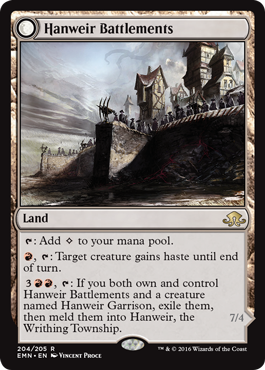
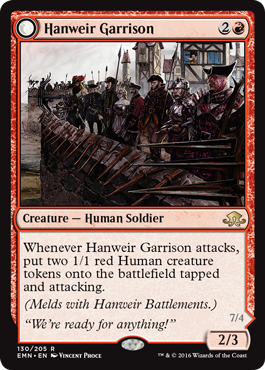
If you own and control Hanweir Battlements and Hanweir Garrison, they'll both be exiled and become this:
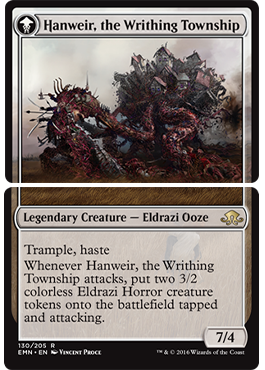
Well. That's disturbing. There are three pairs of meld cards: Hanweir Battlements and Hanweir Garrison, plus two more you can read about in other articles on DailyMTG today.
Hanweir, the Writhing Township is one permanent represented by two cards. It behaves like any other creature does. It can attack and block. It has abilities that work. It can be enchanted or equipped. You can put counters on it. And so on. You can think of it as one big card while on the battlefield and you won't be wrong. It's one creature, so a single spell that says "Destroy target creature" takes out the whole permanent. If you're asked to sacrifice a permanent, you can sacrifice Hanweir, the Writhing Township.
The differences kick in if it leaves the battlefield. Wherever that permanent goes, both cards go, and they each turn front face up again. So if it's bounced to your hand, you get Hanweir Battlements and Hanweir Garrison back in your hand. If Hanweir, the Writhing Township is put on top, on the bottom, or in a specific place in a library, the cards' owner chooses their relative order. Anything that performs actions on the cards after they leave the battlefield does so on both cards. In fact, the first thing I thought of when working on meld cards was Journey to Nowhere. How would that work? Imagine my surprise when I saw this in the file:
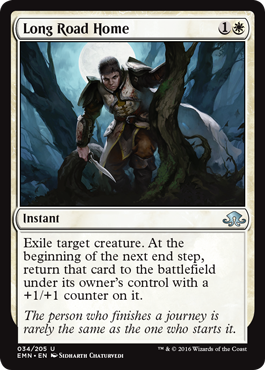
In this case, Hanweir, the Writhing Township is exiled, becoming Hanweir Battlements and Hanweir Garrison face up in exile. Later, both cards are returned to the battlefield, each with a +1/+1 counter. Of course, they'll probably meld again pretty soon, and those counters will disappear. Maybe you really can't go home again.
Like double-faced cards, meld cards have the characteristics of their front faces everywhere except the battlefield. They also can't be turned face down. But remember that meld cards aren't double-faced cards, so they can't transform.
We've taken some steps to avoid shenanigans and some confusing situations. To successfully meld two cards, you must also own and control both of them. If you own and control Hanweir Battlements, then you gain control of a Hanweir Garrison owned by an opponent and activate the ability of Hanweir Battlements, the two permanents will just stare at each other uncomfortably.
Additionally, the two cards must be the actual cards. That means that copies won't work. Token copies especially won't work. But be careful—the ability of Hanweir Battlements has no problem exiling itself and a copy of Hanweir Garrison. But they won't meld, and you won't return either one to the battlefield.
There's a new checklist card to cover all the meld cards. Checklist cards are convenient substitutes for your meld cards to make sure they're indistinguishable from the rest of your deck. (You can also use opaque sleeves to accomplish this, or use both sleeves and checklist cards!) Before the game, just mark which meld card you're playing with, and use the checklist card in the deck. You must have the real meld card with you—just don't mix it up with your sideboard.
Each card is good on its own, but if you manage to get them together...Avacyn help us all. Oh, um. Never mind. Awkward.
They're puzzle pieces. Do the thing. Kick butt.
Emerge
Oh, did I mention Eldrazi popping up everywhere? Let's put it this way: don't be shocked if tentacles sprout from your best friend's face. Emerge is a new ability found on some powerful late-game Eldrazi that lets them hit the battlefield ahead of schedule...not that the Eldrazi know what a schedule is.
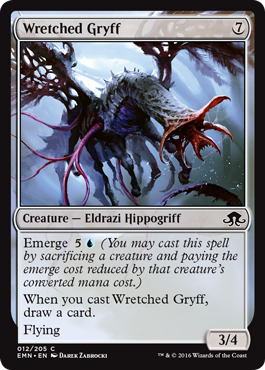
You can always cast a spell with emerge by paying its mana cost as normal. If you've got seven mana available, you have yourself a shiny new Eldrazi Hippogriff. But if you've got a creature to sacrifice, say this Dawn Gryff (ooh, Flavor Judge win?), you can use the emerge ability.
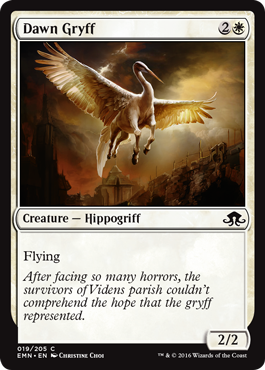
Let's walk through casting a spell with emerge. As an additional cost to cast Wretched Gryff, you sacrifice Dawn Gryff. Now you're paying the emerge cost ({5}{U}) instead of the mana cost ({7}). But you get a further discount: the converted mana cost of the creature you sacrifice. That's three, so now you're paying only {2}{U} to cast Wretched Hippogryff. Quite a deal. The discount you get can't affect the colored mana part of the emerge cost. So even if you sacrifice a creature with converted mana cost 8, you still pay {U} to cast Wretched Gryff.
Using emerge doesn't change when you can cast the spell—during your main phase when the stack is empty, unless the spell has flash...somehow. It also doesn't change that the spell was actually cast. Wretched Gryff's card-drawing ability works either way.
Escalate
The fight on Innistrad is intensifying, and the people are scrambling to bring every weapon possible to bear on friend, foe, and former friend with tentacles coming out of face. To encapsulate this, we have escalate, an ability that lets you get the most out of some modal spells. What's a modal spell? It's an instant or sorcery that offers you a bulleted list of different effects. Like this one:
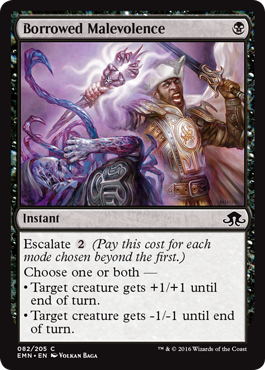
Instead of the default of choosing just one of the modes, escalate cards act like a menu of devastation. If you pay just the mana cost, you choose one of the modes. If you pay the mana cost plus the escalate cost, you can add a mode and get both modes. Of course, not all escalate cards have just two effects. For ones with three effects, you can also pay the mana cost plus the escalate cost twice to get all three effects. For an additional $1.99, we'll throw in a side dish.
You choose modes as part of casting the spell, and once you choose, you can't change your mind if something happens in response to the spell. If you cast a spell with escalate and choose multiple modes, the effects will happen in the order printed on the card. Additionally, you choose the target for each mode separately (if that mode requires one). So, Borrowed Malevolence's two modes could target the same creature or, far more likely, different creatures.
Double-Faced Cards
The double-faced cards you know, love, and fear also show up all over Eldritch Moon. If you weren't around for Shadows over Innistrad or the original Innistrad block, this world must seem really strange to you. But that's okay! In a nutshell, double-faced cards start with their front face up (that's the face with the mana cost), and each has an ability that transforms it to its other face. Many double-faced cards are creatures that transform into more powerful versions of themselves. But then you run across curious little items like Cryptolith Fragment.
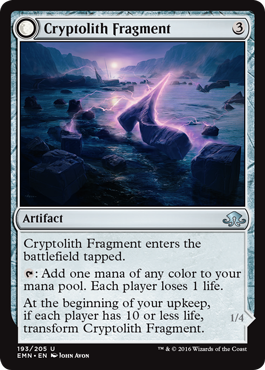
It's a handy tool to both accelerate your mana production and slowly bleed the life out of everyone. And if everyone has 10 or less life at the beginning of your upkeep, you get this:
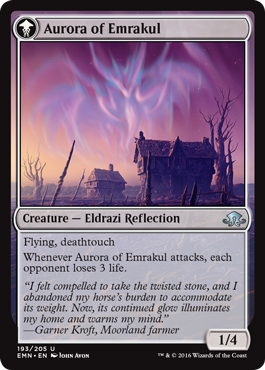
Emrakul's so dangerous, even her reflection will kill you quickly. Remember that transforming a permanent doesn't untap it, so if you happen to tap Cryptolith Fragment for mana in response to its ability before it transforms, the resulting Aurora will be tapped. Transforming a permanent also doesn't give it summoning sickness, so as long as Cryptolith Fragment started the turn under your control, the resulting Aurora will be able to attack the turn it transforms.
Madness
If you thought for a second that madness was going anywhere, you must be truly mad! Madness is a returning ability that lets you cast a spell when you discard it.
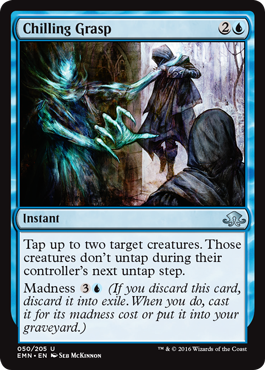
Step one is finding a way to discard the card. Ideally, you can activate an ability of one of your cards that requires you to discard a card. This way, you can get the effect of that ability and cast the card you discarded. Nothing preys upon rampant lunacy like ruthless efficiency!
When you discard a card with madness, it goes to exile instead of your graveyard. Then you can cast the card by paying its madness cost. If you don't cast it, the card is put into your graveyard.
Delirium
The other returning mechanic from Shadows over Innistrad is delirium. Delirium is an ability word, so it doesn't have any special rules meaning, but it's used to highlight abilities that turn on or improve if you have four or more card types among cards in your graveyard. Here's Gnarlwood Dryad:
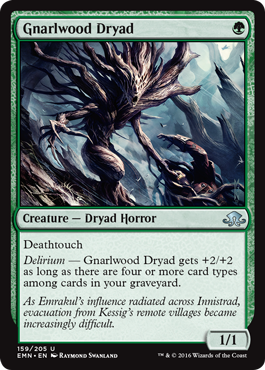
As a reminder, the card types that can appear in your graveyard are artifact, creature, instant, land, planeswalker, enchantment, sorcery, and tribal (a card type found on older cards). Supertypes such as basic or legendary don't count. Subtypes like Eldrazi or Aura also don't count. It also doesn't matter how many cards are in your graveyard, as long as you get to at least four card types. An artifact creature, a sorcery, and a land in your graveyard will give Gnarlwood Dryad +2/+2.
Some instant and sorceries have delirium abilities, giving the spell an upgraded or alternate effect if your graveyard is well-stocked. You'll also run into activated delirium abilities. Each one's different, so as always, tread...er, read carefully.
The Eldritch Get Eldritcher
You're now ready to face the horrors of the Eldritch Moon Prerelease. And by "horrors," I am of course referring to the traffic. The set is filled to bursting with awesome new cards, secrets to discover, and tentacles shooting out of faces. Out of faces! Enjoy the rest of the preview season.

